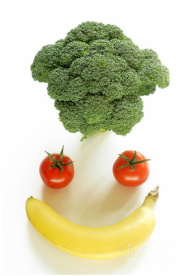 Good nutrition isn't just important for the health of our bodies but essential for our mental health. With the news this week that childline has been inundated with anxiety calls as children express fears over global events, its more important than ever that we understand mental health and the role of nutrition both for ourselves and the next generation. Stress and anxiety play a crucial role in health and can have long term effects and influence the course of a chronic illness. (https://www.ncbi.nlm.nih.gov/pmc/articles/PMC2568977/) I work on a holistic basis meaning I view the entire body as interconnected and can only be viewed as whole rather than just one part. When I look at someone's health, I take into consideration mental and social factors not just the symptoms a person may be expressing. Recent evidence shows that food plays an extremely important role in the development and prevention of specific mental health problems such as depression, ADHD, schizophrenia, and Alzheimer’s disease. Nearly every chemical that controls the brain has been identified in the gastro-intestinal tract. Interesting? Scary? We really are what we eat... NUTRIENTS TO HELP IMPROVE MOOD: IRON: Lack of iron in the diet can leave us feeling tired and lethargic and increases the risk of anaemia. Include a good supply of iron rich foods such as red meat, poultry, fish, tofu, lentils and pumpkin seeds. Avoid drinking tea with meals and try and include a vitamin C rich source of food (e.g. broccoli, oranges and strawberries) alongside meals to help increase absorption of iron. OMEGA 3: Omega 3 from fish has been studied in terms of the positive effects on mood and lowering the risk of depression. Fish highest in omega 3 include salmon, sardines, mackerel and herring. SELENIUM: Too little selenium in the diet may leave us feeling depressed or low. Brazil nuts, legumes, lean meat, seafood, seeds and wholemeal bread are good sources of selenium. VITAMIN D: More and more we are learning about how crucial this vitamin is to our mental health and well being. Our body is able to synthesise vitamin D from exposure to the sun but for the majority of people living in Northern Europe, this isn’t always possible year-round. A few foods contain vitamin D so good to include in your regular diet: fatty fish such as salmon, tuna and mackerel; eggs and beef liver are the highest sources. B VITAMINS: Lack of B vitamins can result in irritability, tiredness and feelings of depressed mood. The B vitamins are crucial in how energy is produced in the body and can be found in a wide variety of foods. Folic acid (folate) and vitamin B12 are particularly important for older adults in preventing mood disorders and dementias and can be found in liver, green leafy vegetables, citrus fruits, broccoli and beans. TRYPTOPHAN: Although research is on-going into the effects of this amino acid, it is known that tryptophan helps make serotonin (‘the happy hormone’). So including it in your diet is certainly a good idea. Food rich in this include bananas, walnuts, brown rice, sunflower seeds and animal protein rich foods such as turkey, eggs, chicken and fish. FOODS THAT CAN GIVE YOU A LOW: ALCOHOL: It might seem strange but alcohol is a depressant and can result in lowering your mood. SUGAR: Sugar and refined foods tends to cause an initial ‘high’ which we find pleasurable. However, that soon wears off as the body increases its insulin production, leaving you feeling tired and low. CAFFEINE: Although caffeine is known to give us energy bursts, caffeine raises Cortisol levels in the body (known as the stress hormone). Best avoided if you are feeling under stress anyway. LIFESTYLE: Don't underestimate the power of a few lifestyle changes which can make all the difference to mood and anxiety. Exercise is well known for its stress relieving abilities. It doesn't have to be high intensity running or exercise classes if that isn't your thing. Yoga, pilates even just taking a walk in the park can do immense good. Finding an activity which you find relaxing - gardening, cooking, reading the paper whatever it is find your 'thing' and enjoy it! Lastly, for those of you who want to try something new. A technique known as 'earthing' or 'grounding' where quite literally a person takes time to reconnect with the Earths surface electrons by walking barefoot outside. This advocates a general feeling of well being and even reports of physiological changes including reducing pain, stress and improving sleep. Sound a bit woo-woo? What have you got to lose - plus there is actual scientific research behind this: https://www.ncbi.nlm.nih.gov/pmc/articles/PMC3265077/ https://www.ncbi.nlm.nih.gov/pmc/articles/PMC4378297/ SOURCES: Diet and Mental Health (2015) Available at: http://www.mentalhealth.org.uk/help-information/mental-health-a-z/D/diet/ Food and Mood (2014) Available at: https://www.bda.uk.com/foodfacts/foodmood.pdf
2 Comments
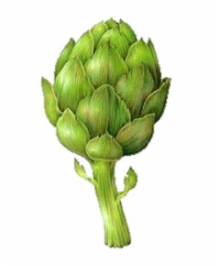 This is a beautiful recipe (adapted from the ocado website) which I love for three reasons. 1. It is super quick, easy and tasty. 2. From a nutritional point of view, its a winner. 3. People don't eat enough artichokes, which are, in my opinion a 'super' food. Artichoke is a great source of vitamin K, vitamin C and folate as well as the minerals calcium, magnesium and potassium. Plus full of fibre. Which we love. It's also full of antioxidants, in fact a study by the American Society for Clinical Nutrition (http://ajcn.nutrition.org/content/84/1/95.abstract), concluded it has a higher antioxidant status than blueberries and dark chocolate! Artichoke also contains constituents which have liver protective qualities. Which lets be honest, at this time of year, when our bodies, immune system and livers get a battering, can only be a good thing! It can increase the production of bile (okay sounds gross but totally necessary) which helps speed up the transit of food through your digestive system, reducing bloating. In fact they were used as a digestive aid in Egyptian times - and of course now we know exactly why. Its also a prebiotic, which feeds the probiotics (or 'good' bacteria) that resides in your stomach. Artichoke is also reported to be beneficial for those with:
Whilst these more serious issues may warrant taking artichoke leaf extract (under the guidance of a doctor or qualified nutritional therapist), eating more artichokes is almost certainly going to be beneficial to health. The heart of the artichoke is eaten because it is softer and the most edible part of the plant. Whilst it would be recommended to buy and prepare your own artichokes, this is, well...hard work to be honest! Buying a jar of artichoke hearts is very acceptable. Make sure it is preserved in olive oil with no / little added salt. So hopefully I have persuaded you about why the artichoke is so great. Here is a wonderful way to serve it at a dinner party, or just smother it on toast or crackers for an incredible health boosting taste sensational snack. This recipe also contains raw garlic (with potential cholesterol lowering, antibacterial, anti-fungal, blood pressure activity) virgin olive oil (with antioxidant, vasodilating, and antiplatelet properties, and potentially cholesterol lowering) and fresh basil (antibacterial, anti-inflammatory and cardiovascular health benefits). So really this is a superfood dip! Serves 2-4. Takes 5 minutes maximum. Ingredients
Instructions In a food processor, blend together all the ingredients. Whizz until smooth. Add a squeeze of lemon juice and top with a little zest before serving with crudités or wholewheat breadsticks. ENJOY! 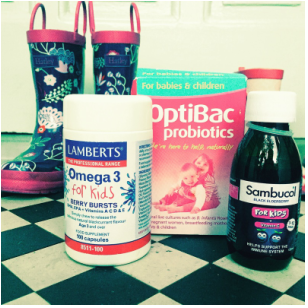 Yes autumn (aka snot season!) is most definitely here. And whilst its lovely to be having wood fires again and wrapping up in hats and scarves, it does bring the inevitable sniffy noses, feeling run down and days off school or work.....big sighs..... After completeting my studies and learning a little more about the importance of supplementing in certain situations, I regularly make sure I supplement my children's already pretty healthy diet. I see this as strengthening their own natural immune defences and keep them in optimal health throughout the year. Nothing in this area is totally black and white and it really is up to the informed choice of the parent, but I would always say when asked why I choose to supplement, which is better - acting preventatively or waiting till the child is unwell then dosing up on Calpol or antibiotics? Most people now know the risk of antibiotics which should really only be given in an emergency situation and not for many seasonal illness' (remember antibiotics kill bacteria infections NOT viral!) But recently there has been much in the mainstream media about the overuse of Calpol with children. It should always be remembered that Calpol whilst suitable for children, is still paracetamol, a pharmaceutical drug which a small body has to process and detoxify. Paediatricians are now warning that overdoing paracetamol or giving high doses increases the risk of developing asthma, as well as kidney, heart and liver damage. It should only be given to a child in pain and discomfort or with a very high fever and not for general malaise or a slight temperature. Whilst given with the best intentions, parents can often do more harm than good. So, to avoid these situations I try and make sure a. my children's diet is good (sometimes easier said than done!) and b. I give them supplements for areas I feel they may be deficient. There is much evidence and advice now given by the NHS about the importance of supplementing children under 5 living in the UK with vitamin D, A and C all of which play a crucial role in our immune defence. (http://www.nhs.uk/conditions/pregnancy-and-baby/pages/vitamins-for-children.aspx) I choose to give these vitamin to my children with an omega 3 fish oil high in DHA (Lamberts) to support cognitive function plus brain and eye development - again very well researched and documented health benefits. My children don't eat a lot of oily fish as much as I try (!) so I feel happier knowing they are getting a source from elsewhere to support their continuing development: https://www.ncbi.nlm.nih.gov/pmc/articles/PMC3738999/ I also feel a probiotic is justified in the winter months and there is some research on the reduction of common infectious diseases in children who are given probiotics https://www.ncbi.nlm.nih.gov/pubmed/20729255 And if you have had to given your child antibiotics, it is a good idea to look into building up their 'good' bacteria reserves again with a good quality probiotic supplement if possible. I like the brand Optibac as all their probiotics are fully backed up by current research. Lastly, I use Sambucol, an elderberry extract, during winter also. Elderberry is a traditional method of warding off colds and flu. https://www.ncbi.nlm.nih.gov/pubmed/27023596 And recent studies have also found it effective in the treatment of flu, cutting the severity and duration of the illness if taken soon after symptoms appear: http://www.webmd.com/cold-and-flu/news/20031222/elderberry-fights-flu-symptoms And most excitingly, no side effects. Always great to have in your bathroom cabinet I say! For years we have been told that skipping breakfast is unacceptable. Now intermittent fasting is all the rage, so confusingly it seems en-vogue to skip breakfast again. So what's the answer? Truth be told, like everything with nutrition, it depends on the person. I personally believe, backed up by scientific studies, that skipping breakfast for most people leads to poor food choices throughout the day and increased calories through the day. (Read here: http://www.ncbi.nlm.nih.gov/pubmed/15699226 & http://www.ncbi.nlm.nih.gov/pubmed/23672851 & http://www.ncbi.nlm.nih.gov/pubmed/11836452?dopt=Abstract) Another mistake commonly made is when people choose overly sweet, sugary breakfasts over healthy, filling breakfasts. A lot of common breakfasts choices are actually akin to eating a dessert first thing in the morning. Packed full of sugar which is going to drive up insulin and lead to cravings mid-morning. If you are trying to lose or even just maintain weight, this isn't going to help. The first meal you eat in a day is most likely going to set your metabolic intentions for the day. If you start off eating rubbish, most likely you will continue this throughout the morning and afternoon. Breakfast is also the meal you are least likely to want to change. If you are someone who DOES eat breakfast regularly and within the first hour of waking, you will most likely reach for something convenient and habitual. Meaning, humans as creatures of habit find it difficult to think about eating something new, first thing. Last week on my Instagram feed (instagram.com/gingerandpicklesnutrition) I recorded seven days of my breakfasts to help people with variety and to try something new, quick and easy. They weren't all perfect, there were a couple of cheat days, but I had something different everyday and tried to make them as protein rich as possible. Protein rich breakfasts have been shown to to reduce down the hunger hormone ghrelin so keep you fuller for longer which means less snacking between meals. Winner. Here are some of the ideas you could try at home. Eggs are my go to breakfast most days or else a smoothie but I wanted to try something different everyday to show that variety is possible, easy and delicious.
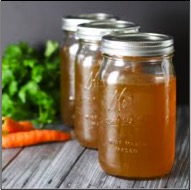 What is bone broth? At this time of year, its a great practice to start making bone broths with leftover bones / carcasses. Bone broth is made by simmering animal bones alongside vegetables, herbs and spices. Delicious, nutrient dense bone broth is very easy and inexpensive to make. Many cultures have used bone broth for centuries as both an inexpensive food source and a traditional medicine. It has long been valued as a tonic for the common cold, joint conditions and digestive disorders. Why is bone broth so good? The bones used to make broth house a variety of powerful nutrients that are released when they are slowly simmered in water. Bone broth is a rich source of minerals, trace minerals, gelatin and amino acids in a form our bodies can easily absorb and use. These nutrients supply the body with the raw materials needed to build strong and healthy cells throughout the body. Bone broth contains calcium, magnesium and phosphorus which support bone and tooth health. The collagen content of bone broth supports the health of joints, hair, skin and nails. Collagen from the bones is broken down during the cooking process into another protein called gelatin. The gelatin in bone broth works to support and repair the lining of the gut. Certain compounds (chondroitin sulfate and glucosamine) extracted into the broth from cartilage tissue help to reduce joint pain and inflammation, whilst stimulating the growth of new collagen. The amino acids found in bone broths support detoxification and collagen production (important in wound healing). They also suppress inflammation, an important consideration for those with chronic inflammation or auto-immune conditions. Health benefits
What bones can be used? Bone broth can be made from the bones of beef, pork, lamb, poultry, wild game and/or fish. When selecting bones to make broth from, it is preferable to use organic, grass-fed animals or wild-caught fish. Bones from conventionally raised animals may contain many harmful substances that can leach into the broth. Ingredients: 2-3kg beef/lamb bones, poultry carcasses Large splash of apple cider vinegar or fresh lemon juice (helps with extraction of minerals from the bones) 2 handfuls of onions, celery, leeks 1 tbsp black peppercorns 2-3 dried bay leaves Recipe: Put all the ingredients in a large stainless steel / ceramic cooking pot and cover with cold water. The water should cover the bones by approx.. 5cm with some room at the top of the pan. Bring to the boil with a lid on, then simmer for the required time, whilst skimming off foam from the top. Strain the liquid (use a fine mesh strainer for poultry) and use immediately or leave to cool. Bone broth can keep for several days in the fridge if left undisturbed. Notes: You can use a slow cooker on high for 12+ hours or a pressure cooker for 3+ hours. If freezing it is best to use glass containers and leave room for expansion. Chicken / turkey should cook for 6-12 hours Beef / lamb can cook for 24 hours until bones look bleached. If using fish 8 hours is the best cooking time. The longer the bones simmer, the more nutrients released. Sources used: Hemsley, J; Hemsley M. The Art of Eating Well (2010); http://articles.mercola.com/sites/articles/archive/2013/12/16/bone-broth-benefits.aspx; http://www.westonaprice.org/health-topics/broth-is-beautiful/ |
AuthorLouise Cullen Archives
October 2020
Categories
All
|
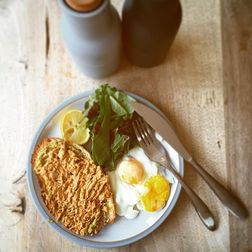
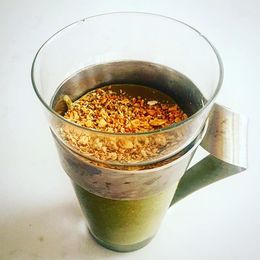
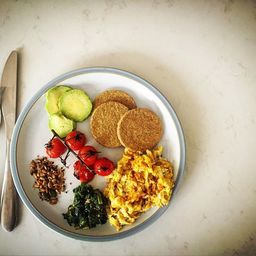
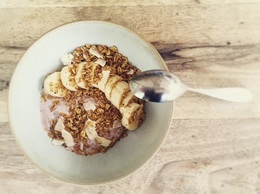
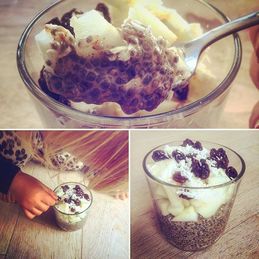
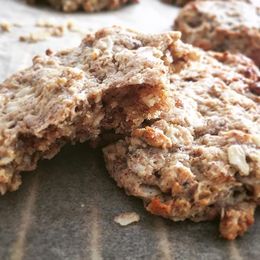

 RSS Feed
RSS Feed
